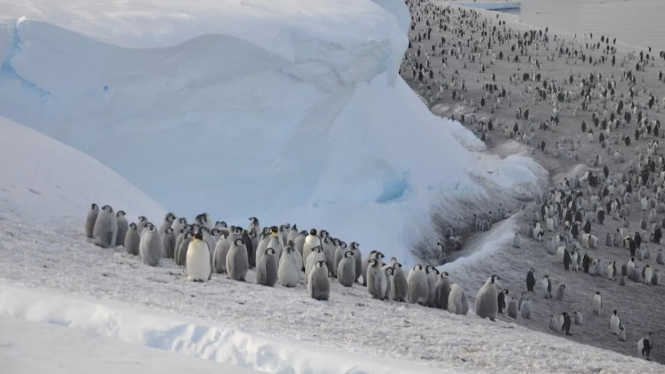Thousands of Penguin Chicks Die in Antarctic Due to Low Ice Levels
- Christopher Walton
Antarctic – Thousands of penguin chicks in four emperor penguin colonies likely died after Antarctic ice experience low level than usual last year, creating a catastrophic breeding failure.
In a study published this week in Communications Earth & Environment, researchers from the British Antarctic Survey outlined the very high probability that most chicks from four out of the five known emperor penguin colonies died in 2022.
Researchers monitored five colonies that range from about 630 pairs to over 3,000 penguin pairs. They counted the birds in the colony using satellite imagery from 2018 to 2022.
Through those images, they noticed that significant sea ice loss at the central and eastern Bellingshausen Sea occurred before the penguin chicks would have developed their waterproof feathers.
According to the study, emperor penguins need access to stable “land-fast sea ice” for breeding and molting, which is when the penguins lose and regain their feathers.
Emperor penguins find their preferred breeding sites in late March to early April. They lay their eggs from May to June. Those eggs hatch chicks after a little over two months.
Penguin kaisar
- Christopher Walton
The chicks grow and eventually fledge, or leave the nest, throughout December and January. But if sea ice breaks up earlier than usual, the chicks are too young to survive the unstable conditions.
Some of the colonies started to see significant ice loss in late November and into early December, according to the satellite images described in the study. In some colonies, the sea ice was almost entirely gone by early December, and the adults in the colonies had to move away from that area.
If search for a picture of an emperor penguin chick, it’s fuzzy because the baby bird still has its downy plumage. The fluffy feathers are adorable, but they are not suitable for the cold water.
These feathers become waterlogged, endangering the chicks if they cannot find stable ground to live on until they are old enough to grow waterproof feathers.
The chicks “will go into the water and either drown or freeze to death even if they do get back out,” Peter Fretwell, the study’s lead author said.
Unlike other animal populations throughout the world, emperor penguins haven’t been subject to large-scale hunting or overfishing. This means that researchers have noticed that climate change is going to be a major driver of population loss for the species.
This is alarming because 2022 wasn’t the only year with dangerously low sea ice that threatened several colonies of emperor penguins. Since 2016, researchers have recorded the four years with the lowest sea ice extent in the more than 40 years of satellite records.
The 2021 to 2022 and the 2022 to 2023 seasons had the lowest sea ice levels on record.
“Recent efforts to predict emperor penguin population trends from forecasts of sea ice loss have painted a bleak picture, showing that if present rates of warming persist over 90% of emperor colonies will be quasi-extinct by the end of this century,” the study authors wrote.
Officials are noticing and acting on how climate change will affect these Antarctic birds. In October 2022, the U.S. Fish and Wildlife Service granted emperor penguins federal protections under the Endangered Species Act.
The especially low sea ice is a downward trend observed since a record high in 2014, according to NASA. What has followed has been the record lows mentioned in the study.
The loss of sea ice will also create tremendous losses for other Antarctic species and for the planet. Antarctica’s ice reflects sunlight away from the planet, which helps regulate global temperatures.
Fretwell told that there could still be time to save Antarctic environments in hopes of protecting them for vulnerable animals.
“It’s only by changing our behaviour and the amounts of fossil fuels we use will we reverse the trajectory for these emperor penguins, and many other species,” he remarked.



























